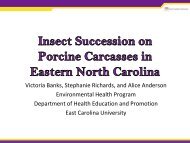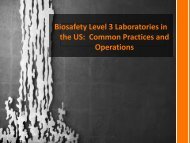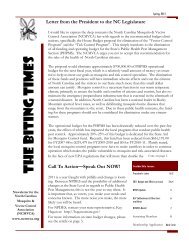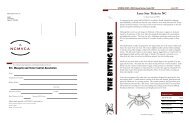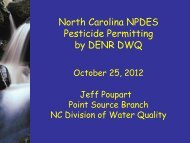Joe Simmons, Best Mgmt Practices, Education - North Carolina ...
Joe Simmons, Best Mgmt Practices, Education - North Carolina ...
Joe Simmons, Best Mgmt Practices, Education - North Carolina ...
Create successful ePaper yourself
Turn your PDF publications into a flip-book with our unique Google optimized e-Paper software.
IPM, IMM, BMP, NPDES, and SOL’s<br />
R. <strong>Joe</strong> <strong>Simmons</strong>, B.A., M.S.Ed.<br />
Director<br />
Chesapeake Mosquito Control Commission<br />
Chesapeake, Virginia
IPM<br />
• IPM or IMM have become very common acronyms for<br />
most of us.<br />
• Integrated Pest Management or Integrated<br />
Mosquito Management are important components<br />
of any BMP (<strong>Best</strong> Management <strong>Practices</strong>).<br />
• IPM defined as-an effective and environmentally<br />
sensitive approach to pest management relying on a<br />
combination of common sense practices. This<br />
management should be accomplished by the most<br />
economical means with the least possible hazard to<br />
people, property and the environment.
What is included in IPM?
Source Reduction<br />
• Get rid of standing water whenever possible.
Larviciding & Adulticiding
<strong>Education</strong>!<br />
If we can convince the public to<br />
eliminate mosquito breeding sites<br />
and protect themselves from<br />
biting mosquitoes, we have just<br />
made out jobs much easier!
HOW DO WE EDUCATE?<br />
Who is easier to teach-children or adults?<br />
Obviously it is children!<br />
There was a time when teachers would<br />
welcome people from the community,<br />
including mosquito control personnel, into<br />
their classrooms to give presentations.<br />
Times have changed!
S.O.L.
In 1995 the Virginia State Board of<br />
<strong>Education</strong> set clear and concise<br />
expectations for student learning<br />
and achievement.<br />
Rigorous<br />
Academic<br />
Measurable<br />
Clear and understandable
WHAT DOES ALL THIS MEAN?<br />
•SOL testing has huge implications<br />
for schools, teachers, students,<br />
and school divisions.<br />
•The pass rate on these tests is<br />
the determining factor on<br />
whether a school retains its<br />
accreditation status.
• Test results are widely publicized and<br />
have even influenced real estate<br />
values as parents seek to purchase<br />
homes in neighborhoods with high<br />
achieving students.<br />
• Added to this is the<br />
No Child Left Behind Act<br />
which adds additional testing and<br />
requirements on schools, teachers<br />
and school divisions. (AYP)
Goals of NCLB Act (2013-2014)<br />
• All children achieve high academic standards and<br />
are proficient in reading and mathematics<br />
• All children of limited English proficiency become<br />
proficient in English<br />
• All children are taught by highly qualified teachers<br />
• All students attend schools that are safe, drug free,<br />
and conducive to learning<br />
• All students graduate from high school.
Teachers are now very conscious of time and<br />
time management. The standards must be<br />
covered, and there is little time for “extra’s”<br />
including visits from the local mosquito control<br />
people.
• In order to EDUCATE you must first have<br />
ACCESS!<br />
• In order to get ACCESS you must be<br />
RELEVANT to what the teacher and students<br />
want.<br />
• In the past we have concentrated on what was<br />
important to US as mosquito control personnel,<br />
but in order to get ACCESS to schools we must<br />
change the way we think.
What does this have to do with me?<br />
• Pennsylvania-Pennsylvania Academic Stanards and<br />
Pennsylvania System of Assessment Anchors-PSSA<br />
• Maryland-Maryland High School Assessments-HSA)<br />
• <strong>North</strong> <strong>Carolina</strong>-ABC’s Accountability<br />
• South <strong>Carolina</strong>-End of Course Examination Program<br />
• Georgia-Georgia Student Assessment Program<br />
• Delaware-Delaware Student Testing Program<br />
• West Virginia-WESTEST
Give ‘em what they want!<br />
• Incorporate the “STANDARDS” into any<br />
education program.<br />
• Help make teacher’s jobs easier and they<br />
will welcome you into their classrooms.<br />
• Give materials to students that will be<br />
beneficial.<br />
• Make yourself known and available!
Using these ideas as a basis, CMCC applied<br />
for an EPA grant.<br />
The logic behind the grant was that<br />
“<strong>Education</strong>” could reduce the number of<br />
breeding sites in our city and thus reduce the<br />
amount pesticides we use.<br />
Grant funds were used to develop a<br />
comprehensive program targeted at<br />
elementary children.
Third Grade Standards<br />
Standard 2.4<br />
The student will investigate and understand that plants and animals undergo a series of<br />
orderly changes in their life cycles. Key concepts include<br />
a) some animals (frogs and butterflies) undergo distinct stages during their lives, while others<br />
generally resemble their parents; and<br />
Standard 3.5<br />
• The student will investigate and understand relationships among organisms in aquatic and<br />
terrestrial food chains. Key concepts include<br />
• producer, consumer, decomposer;<br />
• herbivore, carnivore, omnivore; and<br />
• predator and prey.<br />
Standard 3.6<br />
• The student will investigate and understand that environments support a diversity of plants<br />
and animals that share limited resources. Key concepts include<br />
• water-related environments (pond, marshland, swamp, stream, river, and ocean<br />
environments);<br />
c.) population and community.
Life Cycles
HABITATS
Algae (producer)<br />
Mosquito<br />
larvae<br />
Mosquito-fish<br />
Blue Heron<br />
Bluegill
PROTECT YOURSELF<br />
•Get rid of standing water around<br />
your home<br />
•Without water, mosquitoes cannot<br />
breed
Wear long-sleeved, light colored, loose<br />
fitting clothing!
Use insect repellents containing DEET!
Program included a packet of school<br />
related materials for each student.<br />
•Coloring book (life cycles,<br />
food chains, ways of protecting<br />
yourself, diseases, mosquito<br />
predators, breeding sites, etc.<br />
•Crayons, pens, pencils, rulers<br />
•Scratch pad, magnet, etc. (all<br />
with our phone number)
• The original proposal estimated that we<br />
would present our program to 1000 third<br />
graders during the two year life of the<br />
grant.<br />
• We targeted four elementary schools the<br />
first year with approximately 500 students.<br />
• Teachers liked our program and the “word<br />
got out”!
Number of Schools 11<br />
Number of Classes 64<br />
Number of Students 1605<br />
Additional Students<br />
(Career Days-Six Schools) 1720<br />
Total Students 3325
Number of Schools 17<br />
Number of Classes 133<br />
Number of Students 2642<br />
Career Day Presentations 8<br />
Career Day Students 1785<br />
Total Number of Students 4427
SIX YEAR TOTALS<br />
Number of Students<br />
Full Program (45 Minutes) 14,517<br />
Career Day Students<br />
(Short Program 10 Minutes) 9,906<br />
Total Number Students 24,423
Moral of the Story<br />
• Never be Arrogant!<br />
• Don’t waste your ammunition!<br />
• Whiskey makes you think you’re smarter than<br />
you really are!<br />
• Always make sure that you know who has the<br />
REAL power!<br />
• Don’t mess with old men! They didn’t get old<br />
by being STUPID!
• If you build it, they will come.<br />
• If you make it RELEVANT,<br />
They will call!<br />
And if all else fails------------------
GO FISHING!



